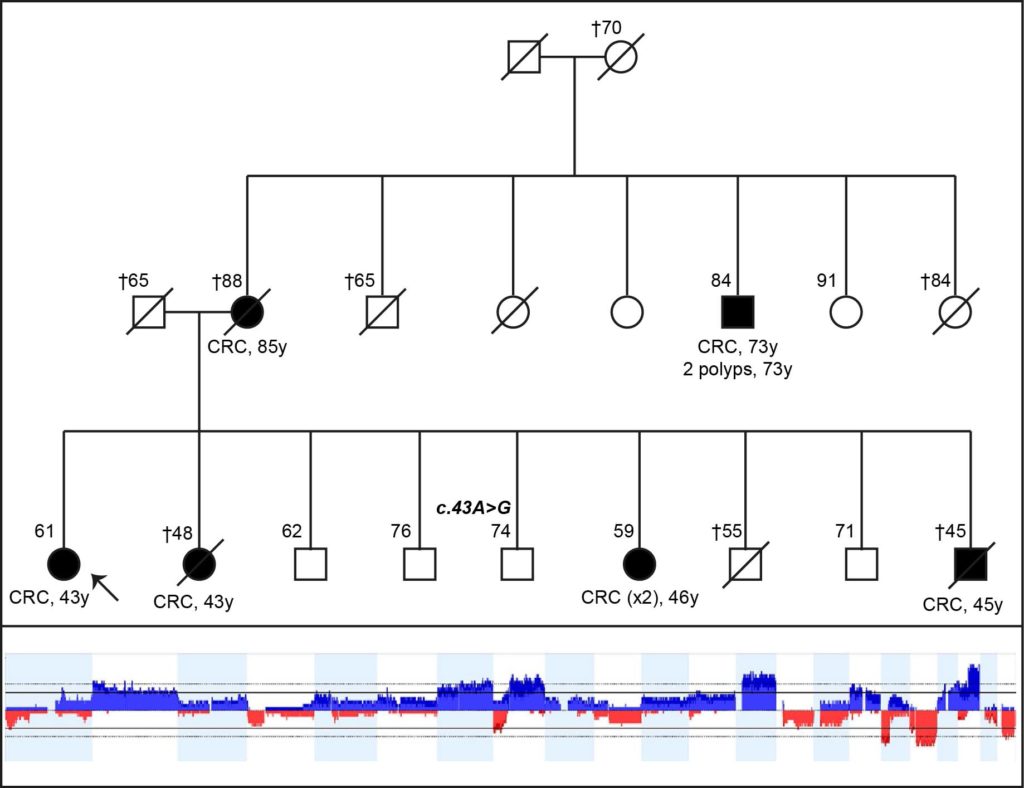During the last decades, it has been made great efforts to elucidate the genetic causes of familial colorectal cancer cases. Nevertheless, including the latest technological advances that have allowed us to study the exome or whole genome of affected members of families, it is not yet possible to explain much of the genetic predisposition to colorectal cancer.
Within the Hereditary Cancer Programme ICO-IDIBELL the research line directed by the researcher Laura Valle Velasco is devoted to the molecular study of high -risk families which the genetic cause of their predisposition of developing colon and rectal cancer is not yet known
In order to identify novel genes of hereditary cancer, the full exome ie the coding part of the genome has been sequencied in affected members of these families. The family study Showed a pattern of apparently dominant inheritance, and family members with cancer have not developed polyps in the colon. Unexpectedly, mutations in a known gene predisposing to colorectal cancer and colonic polyposis and that follows a recessive pattern of inheritance, the MUTYH gene was identified.
Based on the results obtained in this study, they propose a refocusing of the selection process for studying MUTYH families where the presence of a dominant inheritance pattern contributing risk due to mutations in one allele is contemplated, the possibility that polyps do not exist at the time of diagnosis, as well as other tumors molecular features characteristic of hereditary colorectal cancer syndromes: such as microsatellite instability.
Furthermore, supporting previous studies, the analysis of a specific mutation [KRAS c.34G > T (p.G12C )] , characteristic of tumors MUTYH associated, would be proposed as a selection test to families as eligible for study of the gen in germline.
In Addition to the Involvement of the Hereditary Cancer Program this study had the collaboration of groups at the University of Frankfurt (Guido Plotz ) , University of Oviedo ( Xose S. Puente) and the National Center for Genome Analysis ( CNAG ) .
Another study of Valle’s team to characterize families with hereditary colorectal cancer without known genetic causes, has made an exhaustive study of the molecular features of the tumors developed in the context of hereditary nonpolyposis colorectal cancer without Alterations in DNA repair genes that cause Lynch syndrome.
To do this, they have studied genomic alterations, mutations in relevant genes in colon cancer: such as KRAS, BRAF, PIK3CA and TP53, and the overall level of methylation of CpG islands in both hereditary and sporadic tumors. The results indicate that these hereditary tumors show profiles very similar to the sporadic tumors, suggesting high chromosomal instability and a low level of methylation of CpG islands in both.
However, some specific features have Been Identified, as the gain of chromosome 2, loss of 10q or a lower frequency of TP53 mutations, that may be relevant to the clinical management of These patients or for Identifying defects in germline Causing These aggregation of cancer in families . For this project the Hereditary Cancer Program has enjoyed the cooperation of other groups of ICO- IDIBELL (Biomarkers and Susceptibility Unit and Laboratory of Translational Research).
Articles references
Nuria Seguí, Matilde Navarro, Marta Pineda, Nicole Köger, Fernando Bellido, Sara González, Olga Campos, Silvia Iglesias, Rafael Valdés-Mas, Adriana López-Doriga, Marta Gut, Ignacio Blanco, Conxi Lázaro, Gabriel Capellá, Xose S. Puente, *Guido Plotz, *Laura Valle.
MUTYH
mutations in a family with colorectal cancer and an atypical phenotype.
Gut 2014 [Epub ahead of print]
Fernando Bellido, Marta Pineda, Rebeca Sanz-Pamplona, Matilde Navarro, Marga Nadal, Conxi Lázaro, Ignacio Blanco, Victor Moreno, Gabriel Capellá, Laura Valle. Comprehensive molecular characterisation of hereditary non-polyposis colorectal tumours with mismatch repair proficiency. European Journal of Cancer 2014 [Epub ahead of print]

